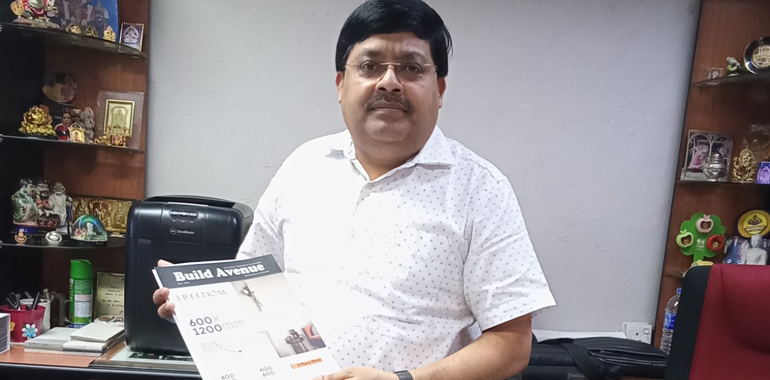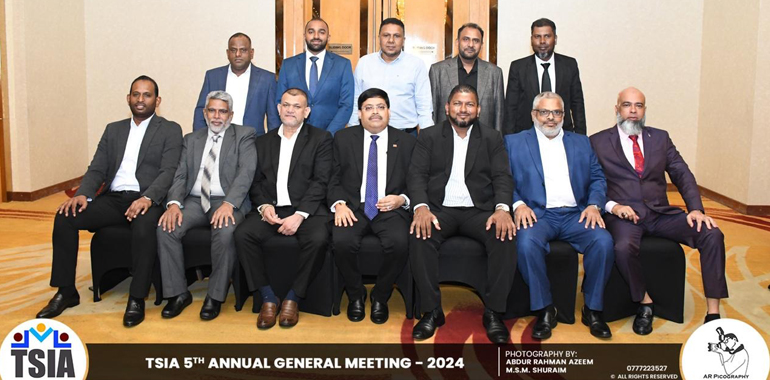Build Avenue Magazine recently visited Sri Lanka to promote Morbi's ceramic industry and conducted interviews with over 80 professionals from the ceramic sector. During this visit, we had the opportunity to interview Mr. Vigneswaran, the newly elected President of the Tiles and Sanitaryware Importers Association (TSIA). Here are some excerpts from our discussion with Mr. Vigneswaran about the tile industry in Sri Lanka:
Build Avenue: Good morning, Mr. Vigneswaran. Thank you for joining us today. To start, could you provide us with a brief overview of the tile industry in Sri Lanka?
Mr. Vigneswaran: Good morning, and thank you for having me. Sri Lanka’s tile industry is a vital part of our economy, closely tied to the growth of the construction and tourism sectors. In recent years, the industry has experienced significant expansion due to technological advancements and increased demand for high-quality building materials. This has solidified its position as a key player in our economic landscape.

Build Avenue: That’s insightful. Can you tell us more about the key players in the Sri Lankan tile industry?
Mr. Vigneswaran: Certainly. The industry features several major players. Lanka Tiles, established in 1986, is one of the largest manufacturers, with a production capacity exceeding 23,000 square meters per day and a reputation for high-quality ceramic and porcelain tiles. Royal Ceramics Lanka PLC, founded in 1990, is another significant player with their brand "ROCELL," producing around 19,000 square meters of tiles daily. Macktiles Lanka (Pvt) Ltd., though a newer entrant, has the largest capacity in the industry, producing around 32,000 square meters per day and is noted for its focus on innovation and quality.
Build Avenue: How does the Tile and Sanitaryware Importers Association (TSIA) fit into this industry landscape?
Mr. Vigneswaran: The TSIA plays a crucial role in the industry. We represent tile importers in Sri Lanka and ensure they adhere to industry standards and maintain discipline within the sector. For exporters looking to enter the Sri Lankan market, establishing a relationship with our association is essential for building credibility and trust, which are key for successful partnerships.

Build Avenue: What are some of the key market dynamics affecting the tile industry in Sri Lanka?
Mr. Vigneswaran: The industry benefits from the booming construction sector and rising demand from the middle class. Before the COVID-19 pandemic, monthly tile consumption was around 2 to 2.5 million square meters. Government policies, including high import tariffs and strict standards, have supported local manufacturers while keeping importers competitive. These dynamics have significantly influenced the industry’s growth and development.
Build Avenue: What are some of the challenges the industry faces, and what opportunities do you see?
Mr. Vigneswaran: The industry faces several challenges, including economic downturns caused by events like the Easter Bombing and the COVID-19 pandemic, which led to temporary import restrictions. However, as the economy recovers, there are opportunities in upcoming infrastructure projects and a growing focus on eco-friendly tiles. To remain competitive, the local industry needs to innovate continuously to keep up with high-quality imported tiles.
Build Avenue: Looking ahead, what is the future outlook for the Sri Lankan tile industry?
Mr. Vigneswaran: The future outlook is quite promising. With increased construction activities and a booming tourism sector, the demand for tiles is expected to grow. While imported tiles will remain popular, local manufacturers are expected to innovate and offer competitive options. The sector’s resilience and adaptability suggest a bright future with ongoing expansion and development.
Build Avenue: Thank you for sharing these insights, Mr. Vigneswaran. Do you have any final thoughts on the state of the tile industry in Sri Lanka?
Mr. Vigneswaran: The tile industry in Sri Lanka is evolving and plays a significant role in our economy. With strong market players and a supportive growth environment, the industry is well-positioned to thrive despite any challenges. By leveraging both local innovation and international trends, we can continue to build a robust and dynamic industry.
Build Avenue: As the new president of TSIA, what are your plans moving forward?
Mr. Vigneswaran: As the new president of TSIA, my focus is on fostering stronger connections between industries in Sri Lanka and India. We are excited to collaborate with Build Avenue (Unimaxx Corporation) to host a B2B event in Colombo this October. This event will enhance relations and create opportunities for importers and exporters from both nations.
Build Avenue: Thank you very much for your time and valuable insights, Mr. Vigneswaran.
Mr. Vigneswaran: Thank you for having me.




















